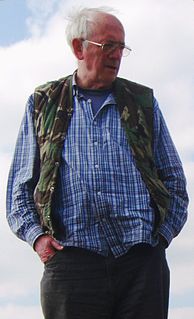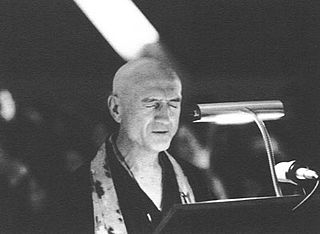A Quote by Northrop Frye
The poet, however, uses these two crude, primitive, archaic forms of thought (simile and metaphor) in the most uninhibited way, because his job is not to describe nature, but to show you a world completely absorbed and possessed by the human mind.
Related Quotes
In the unawakened state you don't use thought, but thought uses you. You are, one could almost say, possessed by thought, which is the collective conditioning of the human mind that goes back many thousands of years. You don't see anything as it is, but distorted and reduced by mental labels, concepts, judgments, opinions and reactive patterns.
I use a lot of similes and metaphors when I work, simply because it's my best way of describing a building or a scene. I'm terrible at describing landscapes - trees, buildings. The inanimate things don't interest me: I always think, "Oh, no, here comes another building I have to describe." So I usually use a simile or metaphor.
The facts of nature are what they are, but we can only view them through the spectacles of our mind. Our mind works largely by metaphor and comparison, not always (or often) by relentless logic. When we are caught in conceptual traps, the best exit is often a change in metaphor not because the new guideline will be truer to nature (for neither the old nor the new metaphor lies "out there" in the woods), but because we need a shift to more fruitful perspectives, and metaphor is often the best agent of conceptual transition.
Every civilized human being, whatever his conscious development, is still an archaic man at the deeper levels of his psyche. Just as the human body connects us with the mammals and displays numerous relics of earlier evolutionary stages going back to even the reptilian age, so the human psyche is likewise a product of evolution which, when followed up to its origins, show countless archaic traits.
Shakespeare possesses the power of subordinating nature for the purposes of expression, beyond all poets. His imperial muse tosses the creation like a bauble from hand to hand, and uses it to embody any caprice of thought that is uppermost in his mind. The remotest spaces of nature are visited, and the farthest sundered things are brought together, by subtle spiritual connection. We are made aware that magnitude of material things is relative, and all objects shrink and expand to serve the passion of the poet.
How to become a really modern society when today we are so - as a human being, we feel so powerful. We have high technology and a superb way of controlling our life. And at the same time, in many ways we are so primitive. We are not on - even just a step away from the most brutal and primitive crudity. To be very crude on those issues, which is always challenges and we always have to look at the situation like a mirror, to draw some understanding.
When the mind becomes so completely absorbed in perfect health that all sickness is forgotten, all the powers of mind will proceed to create health, and every trace of sickness will soon disappear. When the mind becomes so completely absorbed in higher attainments and in greater achievements that all thought of failure is forgotten, all the forces of mind will begin to work for the promotion of those attainments and achievements. The person will be gaining ground every day, and greater success will positively follow.
One of the appeals of William Carlos Williams to me is that he was many different kinds of poet. He tried out many different forms in his own way of, more or less, formlessness. He was also a poet who could be - he was a love poet, he was a poet of the natural order and he was also a political poet.
If speculation tends thus to a terrific unity, in which all things are absorbed, action tends directly back to diversity. The first is the course or gravitation of mind; the second is the power of nature. Nature is manifold. The unity absorbs, and melts or reduces. Nature opens and creates. These two principles reappear and interpenetrate all things, all thought; the one, the many.
































